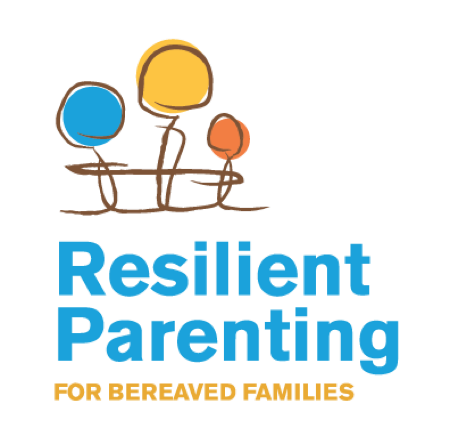
Resilient Parenting for Bereaved Families
To learn more about this program, visit:
WHAT IS THE RESILIENT PARENTING FOR BEREAVED FAMILIES PROGRAM?
The Resilient Parenting for Bereaved Families (RPBF) Program is a 10-session group program for caregivers of children who have experienced the death of a parent. While each family’s grief journey is unique, our research has shown that resilience in caregivers and children can be promoted by:
- Teaching practical tools to build family bonds
- Creating a warm, supportive group environment for learning and practicing the tools
- Helping caregivers to develop five key building blocks of resilience in their family (which our research has shown helps lead to long-term positive development for children!)

HOW DOES THE RESILIENT PARENTING FOR BEREAVED FAMILIES PROGRAM (RPBF) WORK?
Surviving parents and caregivers are the most powerful resource for helping bereaved children to cope following the death of their parent. Our program teaches practical parenting and self-care tools that have been shown to promote resilience for both children and caregivers.
HOW DO WE KNOW THE PROGRAM WORKS?
The RPBF is based on the most extensively evaluated program for parentally bereaved children, the Family Bereavement Program. We tested the program in a randomized trial funded by the National Institute of Mental Health and followed families up to 15 years later.
As compared with families who did not participate in the program those who did experienced the following benefits:
- Lower levels of distressing grief
- Lower levels of depression, anxiety and suicidal thoughts/attempts
- Lower use of mental health services and psychiatric medication
- Higher levels of self-esteem
Benefits for bereaved parents also lasted up to 15 years after the program:
- Higher quality of positive parenting
- Higher efficacy of coping with stress
- Lower rates of complicated grief
- Lower levels of depression
- Lower rates of alcohol abuse
HOW CAN I BEGIN USING THE RESILIENT PARENTING FOR BEREAVED FAMILIES PROGRAM?
The program is now available for use by providers who are serving parentally-bereaved families in communities across the United States and internationally. We have developed a comprehensive training program that includes providing supervision for new leaders as they deliver the program for the first time. We support you every step of the way in becoming an outstanding leader. The training program includes a website for leaders that provides everything you need to deliver the program and a supervisor who helps you prepare for each session. After successfully delivering the program, you will be certified to lead the program independently for three years. There is also a parent website and parent handbook that provide tips on how to use all program tools.
ACKNOWLEDGEMENTS
We gratefully acknowledge the National Institute of Mental Health which supported the research on the Family Bereavement Program. We also gratefully acknowledge the New York Life Foundation which supported the translation of the program from a university based research program into a sustainable community-based service, the Resilient Parenting for Bereaved Families Program. We also acknowledge the collaboration of providers and parents at The New Song Center (Phoenix), Circle of Care (Oakland), Uplift (Philadelphia), and Good Grief (New Jersey) in translating the program into a practical, feasible and sustainable community service.
RESEARCH BEHIND THE PROGRAM
The Resilient Parenting for Bereaved Families Program is based on the caregiver component of the Family Bereavement Program which has been extensively evaluated. The citations below describe the research supporting the benefits of the Family Bereavement Program for children and bereaved parents. The Resilient Parenting for Bereaved Families Program represents our efforts in collaboration with community agencies to translate the program into a sustainable service for bereaved families.
- Wolchik, S. A., Coxe, S., Tein, J. Y., Sandler, I. N., & Ayers, T. S. (2009). Six-year longitudinal predictors of posttraumatic growth in parentally bereaved adolescents and young adults. Omega: Journal of Death and Dying, 58(2), 107-128. doi: http://dx.doi.org/10.2190/OM.58.2.b
- Wolchik, S. A., Ma, Y., Tein, J.-Y., Sandler, I. N., & Ayers, T. S. (2008). Parentally bereaved children's grief: Self-system beliefs as mediators of the relations between grief and stressors and caregiver-child relationship quality. Death Studies, 32(7), 597-620. doi: http://dx.doi.org/10.1080/07481180802215551
- Sandler, I. N., Wolchick, S. A., Ayers, T. S., Tein, J. Y., Coxe, S., & Chow, W. (2008). Linking theory and intervention to promote resilience in parentally bereaved children. In M. Stroebe & W. Stroebe (Eds.), Handbook of Bereavement Research and Practice: Advances in Theory and Intervention (pp. 531-551). Washington, DC: American Psychological Association.
- Haine, R. A., Ayers, T. S., Sandler, I. N., & Wolchik, S. A. (2008). Evidence-based practices for parentally bereaved children and their families. Professional Psychology: Research and Practice, 39(2), 113-121. doi: 10.1037/0735-7028.39.2.113
- Wolchik, S. A., Tein, J.-Y., Sandler, I. N., & Ayers, T. S. (2006). Stressors, quality of the child-caregiver relationship, and children's mental health problems after parental death: The mediating role of self-system beliefs. Journal of Abnormal Child Psychology, 34(2), 221-238.
- Schmiege, S. J., Khoo, S. T., Sandler, I. N., Ayers, T. S., & Wolchick, S. A. (2006). Symptoms of internalizing and externalizing problems: Modeling recovery curves after the death of a parent. American Journal of Preventive Medicine, 31(6 Suppl 1), S152-160.
- Haine, R. A., Wolchik, S. A., Sandler, I. N., Millsap, R. E., & Ayers, T. S. (2006). Positive parenting as a protective resource for parentally bereaved children. Death Studies, 30(1), 1-28.
- Sandler, I., Kennedy, C., Balk, D., Jordan, J., Nadeau, J., & Shapiro, E. (2005). Bridging the Gap between Research and Practice in Bereavement: Report from the Center for the Advancement of Health. Death Studies, 29(2), 93-122.
- Kwok, O.-M., Haine, R. A., Sandler, I. N., Ayers, T. S., Wolchik, S. A., & Tein, J.-Y. (2005). Positive Parenting as a Mediator of the Relations Between Parental Psychological Distress and Mental Health Problems of Parentally Bereaved Children. Journal of Clinical Child and Adolescent Psychology, 34(2), 260-271.
- Lin, K. K., Sandler, I. N., Ayers, T. S., Wolchik, S. A., & Luecken, L. J. (2004). Resilience in parentally bereaved children and adolescents seeking preventive services. Journal of Clinical Child and Adolescent Psychology, 33(4), 673-683. doi: 10.1207/s15374424jccp3304_3
- Ayers, T. S., Kennedy, C. L., Sandler, I. N., & Stokes, J. (2003). Bereavement, Adolescence. In M. Bloom & T. P. Gullotta (Eds.), Encyclopedia of Primary Prevention and Health Promotion (pp. 221-229). New York: Kluwer Academic/Plenum.
- Sandler, I. N., Ayers, T. S., & Romer, A. L. (2002). Fostering resilience in families in which a parent has died. Journal of Palliative Medicine, 5(6), 945-956. doi: 10.1089/10966210260499195
- West, S. G., Sandler, I., Pillow, D. R., Baca, L., & Gersten, J. C. (1991). The use of structural equation modeling in generative research: Toward the design of a preventive intervention for bereaved children. Special Issue: Preventive Intervention Research Centers. American Journal of Community Psychology, 19(4), 459-480.
- Sandler, I., Gunn, H., Mazza, G., Tein, J. Y., Wolchik, S., Kim, H., Ayers, T., & Porter, M. (in press). Three perspectives on mental health problems of young adults and their parents at a 15-year follow-up of the Family Bereavement Program. Journal of Consulting and Clinical Psychology.
- Sandler, I., Tein, J. Y., Cham, H., Wolchik, S., & Ayers, T. (2016). Long-term effects of the Family Bereavement Program on spousally-bereaved parents: Grief, mental health, alcohol problems and coping efficacy. Development and Psychopathology, 28, 801-818. doi:10.1017/S0954579416000328
- Sandler, I., Tein, J. Y., Wolchik, S. A., & Ayers, T. (2016). The effects of the Family Bereavement Program to reduce suicide ideation and/or attempts of parentally bereaved children six and fifteen years later. Suicide and Life Threatening Behavior, 46, S32-S38. DOI: 10.1111/sltb.12256
- Schoenfelder, E. N., Tein, J. Y., Wolchik, S. A., & Sandler, I. N. (2015). Effects of the Family Bereavement Program on academic outcomes, educational expectations and job aspirations 6 years later: The mediating role of parenting and youth mental health problems. Journal of Abnormal Psychology, 43, 229-241. doi.org/10.1007/s10802-014-9905-6
- Luecken, L. J., Hagan, M. J., Sandler, I. N., Tein, J.-Y., Ayers, T. S., & Wolchik, S. A. (2014). Longitudinal mediators of a randomized prevention program effect on cortisol for youth from parentally bereaved families. Prevention Science, 15(2), 224-232. doi: http://dx.doi.org/10.1007/s11121-013-0385-7
- Schoenfelder, E. N., Sandler, I. N., Millsap, R. E., Wolchik, S. A., Berkel, C., & Ayers, T. S. (2013). Caregiver responsiveness to the family bereavement program: What predicts responsiveness? What does responsiveness predict? Prevention Science. doi: http://dx.doi.org/10.1007/s11121-012-0337-7
- Luecken, L. J., Hagan, M. J., Sandler, I. N., Tein, J.-Y., Ayers, T. S., & Wolchik, S. A. (2013). Longitudinal mediators of a randomized prevention program effect on cortisol for youth from parentally bereaved families. Prevention Science. doi: http://dx.doi.org/10.1007/s11121-013-0385-7
- Hagan, M. J., Tein, J.-Y., Sandler, I. N., Wolchik, S. A., Ayers, T. S., & Luecken, L. J. (2012). Strengthening effective parenting practices over the long term: Effects of a preventive intervention for parentally bereaved families. Journal of Clinical Child and Adolescent Psychology, 41(2), 177-188. doi: http://dx.doi.org/10.1080/15374416.2012.651996
- Schoenfelder, E. N., Sandler, I. N., Wolchik, S., & MacKinnon, D. (2011). Quality of social relationships and the development of depression in parentally-bereaved youth. Journal of Youth and Adolescence, 40(1), 85-96. doi: http://dx.doi.org/10.1007/s10964-009-9503-z
- Ayers, T. S., Kondo, C. C., & Sandler, I. N. (2011). Bridging the gap: Translating a research-based program into an agency-based service for bereaved children and families Grief and bereavement in contemporary society: Bridging research and practice. (pp. 117-135): Routledge/Taylor & Francis Group, New York, NY.
- Sandler, I. N., Ma, Y., Tein, J.-Y., Ayers, T. S., Wolchik, S., Kennedy, C., & Millsap, R. (2010). Long-term effects of the family bereavement program on multiple indicators of grief in parentally bereaved children and adolescents. Journal of Consulting and Clinical Psychology, 78(2), 131-143. doi: http://dx.doi.org/10.1037/a0018393
- Sandler, I., Ayers, T. S., Tein, J.-Y., Wolchik, S., Millsap, R., Khoo, S. T., . . . Coxe, S. (2010). Six-year follow-up of a preventive intervention for parentally bereaved youths: a randomized controlled trial. Archives of pediatrics & adolescent medicine, 164(10), 907-914. doi: http://dx.doi.org/10.1001/archpediatrics.2010.173
- Luecken, L. J., Hagan, M. J., Sandler, I. N., Tein, J.-Y., Ayers, T. S., & Wolchik, S. A. (2010). Cortisol levels six-years after participation in the Family Bereavement Program. Psychoneuroendocrinology, 35(5), 785-789. doi: http://dx.doi.org/10.1016/j.psyneuen.2009.11.002
- Foster, E., Porter, M. M., Ayers, T. S., Kaplan, D. L., & Sandler, I. (2007). Estimating the Costs of Preventive Interventions. Evaluation Review, 31(3), 261-286. doi: http://dx.doi.org/10.1177/0193841X07299247
- Tein, J.-Y., Sandler, I. N., Ayers, T. S., & Wolchik, S. A. (2006). Mediation of the effects of the Family Bereavement Program on mental health problems of bereaved children and adolescents. Prevention Science, 7(2), 179-195.
- Sandler, I. N., Ayers, T. S., Wolchik, S. A., Tein, J. Y., Kwok, O. M., Haine, R. A., . . . Griffin, W. A. (2003). The Family Bereavement Program: Efficacy evaluation of a theory-based prevention program for parentally bereaved children and adolescents. Journal of Consulting and Clinical Psychology, 71(3), 587-600.
- Sandler, I. N., Wolchik, S. A., Ayers, T. S., Tein, J. Y., & Luecken, L. (2013). Family Bereavement Program (FBP) approach to promoting resilience following the death of a parent. Family Science, 4, 87-95.
- Ayers, T. S., Wolchik, S. A., Sandler, I. N., Towhey, J. L., Lutzke Weyer, J. R., Jones, S., Weiss, L., Cole, E., & Kriege, G. (2013-2014). The Family Bereavement Program: Description of a theory-based prevention program for parentally-bereaved children and adolescent. Omega: Journal of Death and Dying, 66, 293-314.
